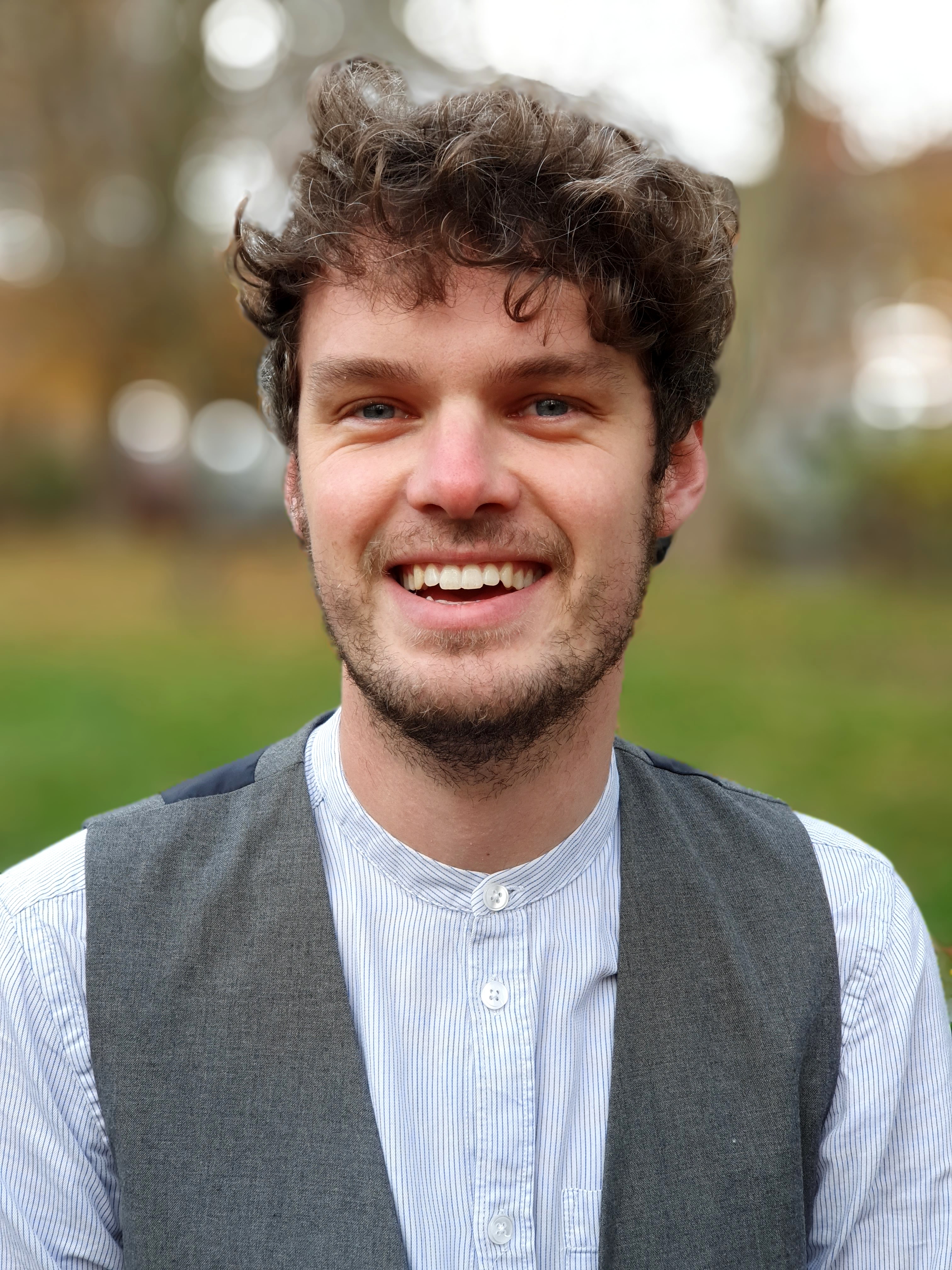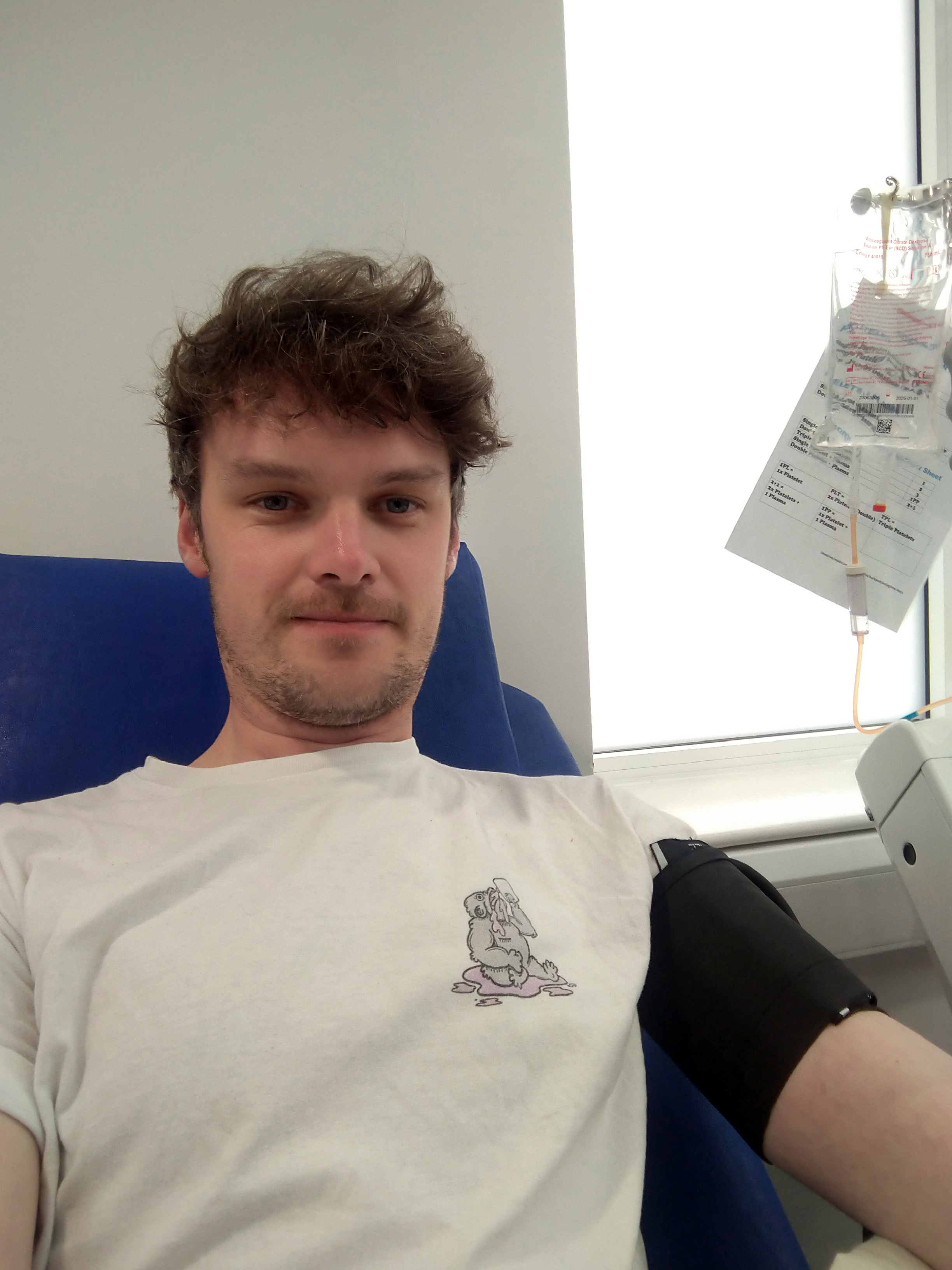“Donating makes me feel proud”
Platelet donor Josh King is aiming for 100 credits. Currently at 34 credits, he shares how his donation journey began...
 “I first donated platelets in 2020. I had given blood a handful of times before that but had never been a frequent donor. After a blood donation in 2019, I was told that my blood was especially well-suited for platelet donation, as I had the ‘universal platelet type’. It could be used for everyone, they told me, and was particularly useful for newborn babies.
“I first donated platelets in 2020. I had given blood a handful of times before that but had never been a frequent donor. After a blood donation in 2019, I was told that my blood was especially well-suited for platelet donation, as I had the ‘universal platelet type’. It could be used for everyone, they told me, and was particularly useful for newborn babies.
(Picture: Josh is aiming for 100 credits)
“At the time, I knew very little about platelet donation, and to be honest, it had never appealed to me either. Spending any longer than ten minutes with a needle in my arm was something I, like most people, was trying to avoid. But when I heard that one donation could drastically improve the lives of up to twelve children, including newborns, I felt compelled and committed.
“This detail struck a particular chord with me because I had been a newborn baby with a severe medical condition myself. I was born with an atrial septal defect, which in simple terms is a hole in the heart, but even though it does sound like something of an emergency, it went completely unnoticed until I was twenty-four and a post-graduate living in New York. During a visit to the campus medical centre for a sore throat, a nursing student, practicing their stethoscope skills on me before an exam, discovered the irregular heartbeat that no other doctor had. Suddenly, a lifetime of short breaths and last place finishes in sports day made sense. The cardiologist told me that I would need open-heart surgery within a couple of years, or the problem would either require a heart-lung transplant or become irrevocable.
“Flying back to the UK and the NHS, I was treated in St Thomas’ hospital by an incredible team of doctors and nurses, and due to the problem usually being discovered in newborn babies, I was operated on by a team of paediatric surgeons. In fact, my surgery was even delayed by the birth of a baby with the same condition that morning. Happily, everything went entirely to plan, and soon enough I was back in the world, with a body that felt ten-times stronger and a heart that was, for the first time in my life, hole-less.
I quickly realised that not only was the process very easy, but also relaxing and, to my great relief, pain-free.
“Three years later, the pandemic started. Quite early on, during the height of the hysteria and horror, I began to experience flashbacks and insomnia related to my surgery. I hadn’t retained many memories of the few morphine-filled, tube-laden post-operation days, hazy as they were, but I couldn’t shake the constant feeling of being hooked up to a machine, weak and afraid.
“Though this feeling persisted for months, and though it was debilitating at its worst, it compelled me to start giving blood again. I wanted to create some positive medical associations to overshadow the flashbacks. That donation was when I discovered my suitability for giving platelets, and I realised that with this I had been given the perfect way to recalibrate my thoughts where tubes and needles and pumping blood was concerned. I could make new, happier memories of medical machines.
Platelets are tiny gold-coloured cells in your blood which help it to clot and stop bleeding. Platelet transfusions can help people with cancer and people who've lost a lot of blood after an accident, organ transplant and other surgery.
Nearly 70 per cent of platelet donations are used to help people with cancer. One donation can help up to three adults or 12 children.
Platelets last just seven days after they’ve been donated, so we rely on people to donate regularly throughout the year.
Call 0300 123 23 23 to book your next appointment to donate.
Thanks to the staff and the simplicity of the process, donating genuinely gives me joy and purpose.
 “Though I can’t say I was looking forward to my first time (despite my many underwhelming experiences with a needle, I was still convinced it was the worst pain possible), I quickly realised that not only was the process very easy, but also relaxing and, to my great relief, pain-free. Don’t get me wrong, the pinprick to test my iron was a little uncomfortable, and the needle going into my arm was hardly fun, but both were over in less than a second. Then, once I was given a pile of snacks and a hot drink, there was literally nothing required of me for just over an hour except reading my book, checking my phone, and sending selfies to my family hoping they would say how much of a hero I was.
“Though I can’t say I was looking forward to my first time (despite my many underwhelming experiences with a needle, I was still convinced it was the worst pain possible), I quickly realised that not only was the process very easy, but also relaxing and, to my great relief, pain-free. Don’t get me wrong, the pinprick to test my iron was a little uncomfortable, and the needle going into my arm was hardly fun, but both were over in less than a second. Then, once I was given a pile of snacks and a hot drink, there was literally nothing required of me for just over an hour except reading my book, checking my phone, and sending selfies to my family hoping they would say how much of a hero I was.
(Picture: Josh donating platelets)
“And I’ve found it gets easier every time I go. Not only because sitting back while the machine does its thing is easy enough to get used to, but also because the staff are so friendly and welcoming. They are obviously good at what they do, but what really stands out is how relatable, warm and bright they are, treating me like a regular at a favourite pub. This makes all the difference to the needle-phobic like me.
“I’ve now come to think of these chunks of time when I donate as moments away from the busyness of my life, when I can engage in something simple, rewarding, and positive. Thanks to the staff and the simplicity of the process, donating genuinely gives me joy and purpose now, to the point where I look forward to each donation. Now I have been donating platelets for a few years and, having recently passed thirty-four donation points, I’ve decided to aim for 100.
“And it’s not just the commemorative medal that motivates me (though I do have a lapel picked out), it’s the fact that donating is one of the few things I do that makes me feel proud, makes me feel lucky, and reminds me that, with little effort, anyone can make a measurable difference to the lives and health of others.”
